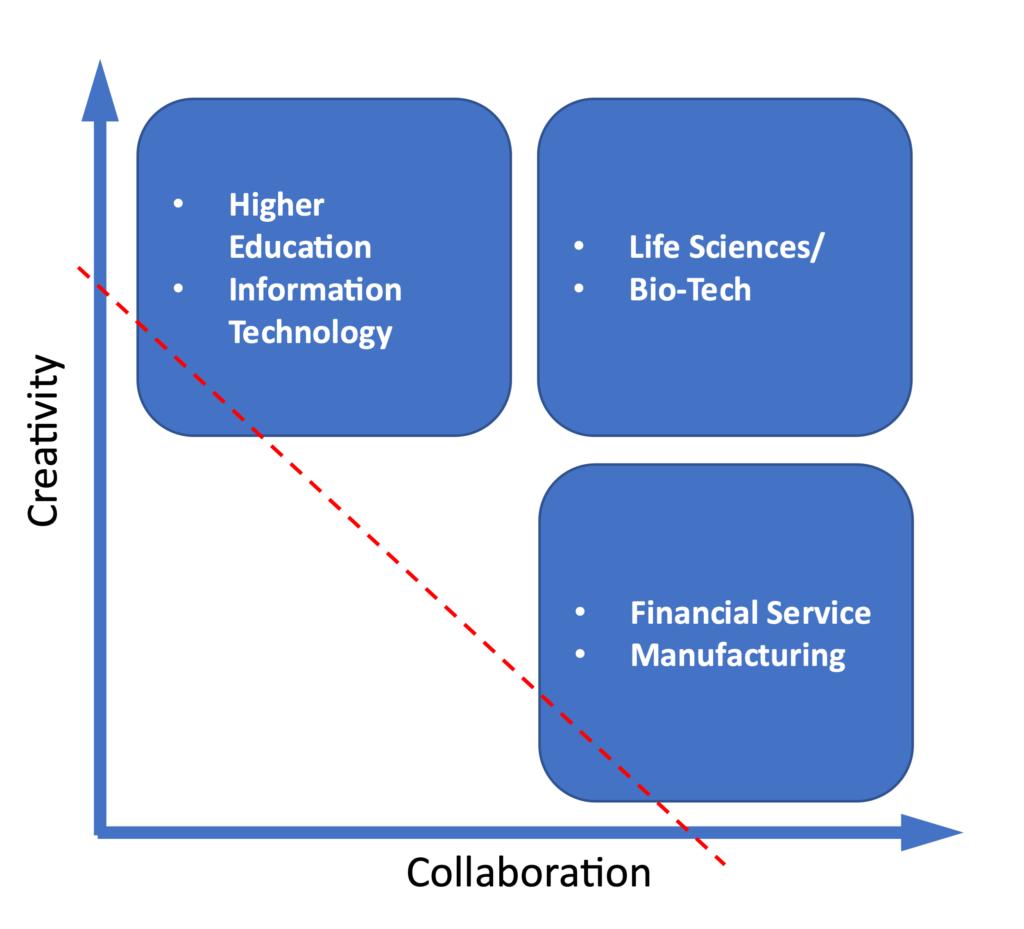About BSG
Markets Served

Overview
BSG is a regional firm serving prominent industry, healthcare, and university clients throughout New England. This region is well known for five prominent market sectors: life sciences/bio-tech, financial services, IT, manufacturing, and higher education.
BSG focuses its services on industries where creativity and collaboration are critical success factors. Improvisational techniques can be powerful tools in such environments. Some industries, such as IT, require a higher degree of innovative and creative thinking in order to succeed. Others, such as healthcare and financial services, require above-average collaboration, cooperation, and team-building to succeed. These qualities can be mapped, illustrating how BSG focuses its work on the upper right-hand of a market sector quadrant.

Life Sciences and Bio-Tech
The New England biotechnology industry emerged partly from extensive university research and Cambridge, Massachusetts’ 1970s decision to allow DNA experimentation and genetic engineering. More biotech and life sciences companies arrived from that foundation, buoyed by leading institutions like Harvard and MIT, as well as top research hospitals including Massachusetts General Hospital, Dana-Farber Cancer Institute, and Brigham & Women’s Hospital.
The Greater Boston area has the highest concentration of biopharma companies in the U.S. Massachusetts leads New England with careers in life sciences, with 3.1% of the state’s population employed in the industry – more than 200% higher than the 1% national average. Between 2010 and 2020, the state experienced a 42% rise in life sciences employment.
BSG provides numerous programs to this industry, including programs and workshops for professional staff and managers in the diagnostics, cosmeceuticals, lab equipment, medical devices, nutraceuticals, pharmaceuticals, therapeutics, and bioinformatics industries. These programs center on building executive, collaboration, team-building, and innovation skills.

Financial Services
The New England financial services sector is one of the region’s strongest job-generating, growth-producing industries, with a tremendous footprint in each of its six states. Massachusetts has many of the world’s most powerful asset management and venture capital firms. Connecticut boasts an outsized share of insurance companies, and Vermont is a global player in the captive insurance realm. Banks help ensure economic development and vitality in hundreds of cities and towns from Bridgeport to Bangor.
The fast-paced, hyper-competitive financial services sector requires strategic leadership and cooperating teams capable of innovating under severe time constraints. In an industry where customers have more choices than ever, financial services firms must think outside the box to attract and retain business. The acquisition of new clients and the creation of financial products begins with engaged professionals performing together at their peak abilities.
BSG delivers programs customized for banking, insurance, investment management, investment banking, capital market, and venture capital clients. Our AIM programs for financial services professionals and managers center on strengthening leadership, institutional culture, customer service, and team-building skills. Venture capital firms frequently utilize BSG’s capabilities to address expansion-related cultural issues in their rapidly growing investments.

Information Technology
New England’s academic leadership in science, engineering, and technical education laid the foundation for its predominance in Information Technology (IT). The region became a primary hub for IT following the MIT WWII Whirlwind project (a first computer). The 1960’s saw the emergence and boom of the Massachusetts minicomputer industry, which spawned the arrival of the personal computer in the late 1970’s. Cellular technologies and the internet fueled continued expansion of New England’s IT industry in fields such as computer security, networking communications, data analytics, internet technologies, and storage.
Today, backed with university research, grants, and progressive policies, New England is seeing a rebirth. Risk-taking young professionals are harnessing the power of social media, where creativity, innovation, and collaboration are critical success factors.
Of paramount importance in the high-stakes, competitive world of IT is the speed and creativity in which products and content are developed, tested, and brought to market. In this environment a tightly-knit collaborative group of staff is essential. AIM techniques are uniquely suited to enhance IT professionals by giving them the confidence to adapt to situations, find creative solutions, better communicate with management and coworkers, and maintain the flexibility needed to accept new ideas. BSG has programs tailored to IT services, hardware, networking, software, security, and internet services. These curriculums concentrate on executive leadership, collaboration, creativity, and team-building skills.

Manufacturing
Industrialized manufacturing in New England dates to the War of 1812. Farming challenges and an abundance of waterways and forests enabled merchants to build water-powered textile, grist, and saw mills along the region’s rivers. Throughout the 19th century, as New England’s clipper ships and whalers swept through the oceans, land-bound settlers exploited the region’s natural resources to run their new mills, and industrial towns sprang to life along New England’s rivers. New England inventors and engineers gained global reputation for manufacturing creativity and innovation that survives today. The phrase “Yankee ingenuity” became a symbol of the region’s manufacturing predominance.
The concentration of higher education institutions, increasing technical and mass production advances, and large amounts of skilled labor continued to advance New England’s industrial and factory leadership. Ship building, machinery, firearms, shoes, watches, and other intricate devices began to supplant textiles and cement New England as a global manufacturing leader.
After 1945, New England’s manufacturing prowess declined as less labor expensive Asia-Pacific firms were able to offer more efficient and lower cost capabilities. However, with imaginative technologies, increased defense spending, and innovative technology centers such as Lincoln Labs, New England saw a manufacturing rebirth. Today, New England hosts a wide range of instrumentation, aerospace, electronics, science, optics, physics, electrical engineering, and computers.
Manufacturing firms are currently having to adapt to a labor skills shortage that is having disastrous consequences for productivity. The retention of skilled employees; the need to address global supply chain challenges, the emergence of IoT, and breakthrough changes in automation and robotics, have <TBD>.
Leadership, collaboration, innovation, and skills development are all key areas vital to compete in a manufacturing environment. In improvisation, adapting to the situation that has been presented rather than the desired one is essential to success. By enhancing professional staff and management’s abilities to listen, compromise, and reconcile, industrial companies will find that the morale and productivity of employees is increased, which results in crucial employee retention.
BSG develops programs for prominent New England firms in the Machinery, Industrial Automation, Electrical & Electronic, Defense & Space, Semi-conductors, Aviation and Aerospace, Mechanical, and Industrial Engineering industries. These curriculums focus on enhancing creativity, innovation, team-building, intra-organizational communications, all of which can increase innovation and reduce production costs.

Higher Education
New England has been a world leader in higher education since colonial times. . There are almost 400 universities, professional, and specialized schools of higher learning that teach more than half a million post-secondary students. New England includes four of the eight ivy league universities and many of the world’s leading technical, law, medicine, and business graduate institutions.
While New England awards over a quarter of a million university degrees each year, there is growing concern among educational leaders and workforce executives that graduates, while well trained in data analysis and technology, often lack sufficient interpersonal, collaboration, and communication skills. The emphasis on technology is thought to produce ill-trained graduates for today’s team-based work environments.
Furthermore, a university environment requires balancing various competing stakeholders, including students, faculty, researchers, alumni, administrative staff, parents, and the community. University administrations face growing challenges relating to rising faculty costs, admissions policy, student debt, remote learning options, the foundational skill gap, and administrative bloat.
BSG offers applied improvisation programs for university staff and undergraduate and graduate students. We add value to all forms of graduate education, including MBA programs, graduate science and engineering curriculums, public policy, law, and health-related programs. When applied to higher education, AIM techniques enhance university leadership, collaboration abilities, and emotional aptitude, leading to increased student satisfaction and staff skills development. Our programs center on building leadership, communications, and networking skills for graduate students who enter business or related commercial fields.
